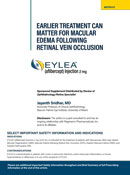The government has a new weapon in its enforcement arsenal. In February 2016, the Department of Health and Human Services (HHS) published its final rule for reporting and returning Medicare overpayments.1 This final rule implements section 6402(a) of the Affordable Care Act (ACA) and mandates that Medicare Part A and B providers and suppliers report and return overpayments within 60 days after they are identified or face steep penalties. The final rule became effective March 14, 2016. Follow these steps to address Medicare overpayments and/or credit balances.
Rule Changed with ACA
Section 6402 of the ACA expanded the Social Security Act by adding subsection 1128J(d). It requires a person who receives an overpayment to report and return the overpayment to the entity that issued it with an explanation of the overpayment.2 The rule also sets a schedule for reporting and returning overpayments by the later of:
(A) the date which is 60 days after the date on which the overpayment was identified; or
(B) the date any corresponding cost report is due, if applicable.2
Enforcement of the 60-day rule comes under the federal False Claims Act (FCA) (31 U.S.C. §3729(b)(3)):
3) Enforcement—Any overpayment retained by a person after the deadline for reporting and returning the overpayment under paragraph (2) is an obligation (as defined in section 3729(b)(3) of title 31, United States Code) for purposes of section 3729 of such title.
(4) Definitions—In this subsection:
(A) Knowing and Knowingly—The terms “knowing” and “knowingly” have the meaning given those terms in section 3729(b) of Title 31, United States Code.
(B) Overpayment—The term “overpayment” means any funds that a person receives or retains under Title XVIII or XIX to which the person, after applicable reconciliation, is not entitled under such title.2
The FCA incorporates substantial penalties. The Civil Monetary Penalties Inflation Adjustment, effective August 1, 2016,3 sets penalties at $10,781 to $21,563 for each false claim, plus up to three times the amount claimed. The FCA defines “knowledge” as: actual knowledge; deliberate ignorance of the truth or falsity of the information; or reckless disregard of the truth or falsity of the information.4
Early Interpretations
Following passage of the ACA overpayment provision, significant debate surrounded the meaning of “...the date which is 60 days after the date on which the overpayment was identified,” and in particular over the definition of “identified.” In August 2015, the Court for the Southern District of New York in U.S. ex rel. Kane v. Healthfirst Inc. issued the first judicial opinion on the 60-day rule and found:
To define ‘identified’ such that the sixty-day clock begins ticking when a provider is put on notice of a potential overpayment, rather than the moment when an overpayment is conclusively ascertained, is compatible with the legislative history of the FCA and the FERA [Fraud Enforcement and Recovery Act of 2009] highlighted by the Government.5
Accordingly, the court held that the date on which a potential overpayment was identified was enough to start the clock. The court also indicated that choosing not to investigate does not eliminate the urgency inherent in the 60-day rule. The court wrote that a provider “has identified an overpayment when the [entity] has determined, or should have determined through the exercise of reasonable diligence, that [it] has received an overpayment,” and adds:
... reasonable diligence might require an investigation conducted in good faith and in a timely manner by qualified individuals in response to credible information of a potential overpayment. … to require ‘actual knowledge,’ … would permit organizations to ‘easily avoid returning improperly received payments.’5
Identifying the Overpayment
In Kane, the court held that the 60-day clock started the moment a provider is first put on notice of a potential overpayment. In the final rule, however, the Centers for Medicare and Medicaid Services (CMS) provides clarity and gives providers additional time to investigate a possible overpayment:
A person has identified an overpayment when the person has, or should have through the exercise of reasonable diligence, determined that the person has received an overpayment and quantified the amount of the overpayment. A person should have determined that the person received an overpayment and quantified the amount of the overpayment if the person fails to exercise reasonable diligence and the person in fact received an overpayment.1
In 2015 the government settled a case with Pediatric Services of America (PSA) for its alleged failure to disclose and return Medicare and Medicaid overpayments. PSA retained credit balances from government payers by absorbing them into their revenue. The Justice Department reported this was the first settlement under the FCA involving a health-care provider’s failure to investigate credit balances to determine whether they resulted from overpayments, citing section 6402 of the ACA and the 60-day rule.6
Mere notification of a possible overpayment does not start the 60-day clock. In the final rule, CMS requires that any investigation of a potential overpayment be completed within six months from receipt of the credible information, absent extraordinary circumstances.
Depending on the overpayment issue, “reasonable diligence” may necessitate looking back in time. The final rule establishes a six-year look-back period. The six years starts on the date the initial overpayment was received.1
Going Forward
Providers can no longer maintain a relaxed attitude about potential overpayments. Skirting the issue is very dangerous. Consider a proactive approach to mitigate your risk by developing a compliance plan as the Office of Inspector General outlines in the “Compliance Program Guidance for Individual and Small Group Physician Practices.”7 RS
REFERENCES
1. US Department of Health and Human Services. Medicare Program: Reporting and Returning of Overpayments; Final Rule. 42 CFR Parts 401 and 405. https://www.gpo.gov/fdsys/pkg/FR-2016-02-12/pdf/2016-02789.pdf. Updated February 12, 2016. Accessed February 3, 2017.
2. US Social Security Administration. Compilation of Social Security Laws: Medicare and Medicaid Integrity Provisions. Sec. 1128J [42 U.S.C. 1320a-7k]. https://www.ssa.gov/OP_Home/ssact/title11/1128J.htm. Accessed February 3, 2017.
3. US Department of Justice. Civil Monetary Penalties Inflation Adjustment. 28 CFR Parts 20, 22, 36, 68, 71, 76 and 85. Federal Register. 216:81:42491-42503. https://www.gpo.gov/fdsys/pkg/FR-2016-06-30/pdf/2016-15528.pdf. Accessed February 3, 2017.
4. US Justice Department. The False Claims Act: A Primer. https://www.justice.gov/sites/default/files/civil/legacy/2011/04/22/C-FRAUDS_FCA_Primer.pdf. Accessed June 12, 2017.
5. United States ex rel. Kane v. Continuum Health Partners Inc. No. 1:11-CV-02325-ER (SDNY 2015). https://www.healthcarelawtoday.com/wp-content/uploads/sites/15/2015/08/Kane-v.-Healthfirst-Inc..pdf. Accessed February 3, 2017.
6. Pediatric Services of American and related entities to pay $6.88 million to resolve False Claims Act allegations. [press release] US Department of Justice United States Attorney’s Office Southern District of Georgia. August 4, 2015. https://www.justice.gov/usao-sdga/pr/pediatric-services-america-and-related-entities-pay-688-million-resolve-false-claims. Accessed February 3, 2017.
7. US Depart of Health and Human Services. Office of Inspector General. Compliance Program Guidance for Individual and Small Group Physician Practices. Federal Register. 2000;65:59434-59452. https://oig.hhs.gov/authorities/docs/physician.pdf Accessed February 3, 2017.



